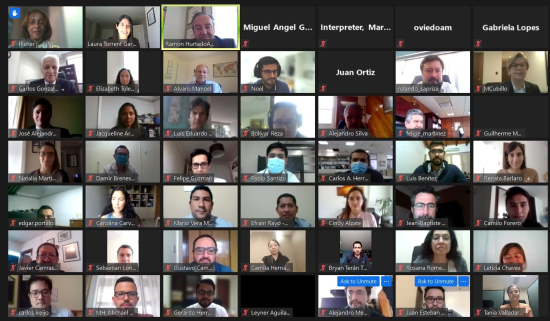
Posted by Laura Torrent, Lesley Fisher, and Alvaro Manoel[1]
As a result of the COVID-19 pandemic, Latin American and Caribbean countries have suffered from reduced fiscal revenues in addition to increased spending, borrowing, called guarantees, and support for state-owned enterprises (SOEs). These trends have increased fiscal risks and deficits.[2] The pandemic has highlighted the need to strengthen fiscal management institutions and infrastructure to mitigate the negative impact on the countries’ growth and fiscal sustainability.
In April 2021, the Fiscal Affairs Department (FAD) and the IMF’s Central America, Panama and the Dominican Republic Technical Assistance Centre (CAPTAC-DR) delivered a regional workshop on Fiscal Risk Management Tools, attended by 71 participants from 17 countries. The main objectives were to share countries’ experiences in managing fiscal risks and discuss some of the tools recently developed by FAD. Four tools were presented:
- The Fiscal Risks Analysis Template (FRAT) can be used in low capacity environments as well as advanced countries. It analyzes a wide spectrum of risks, mixing qualitative and quantitative assessments. The tool presents portfolio level reports that include historical risk realizations, forecast error analysis and fan charts, a risk rating matrix, etc. Its outputs can be used for international comparisons.
- The COVID-19 Fiscal Stress Test analyzes the economic impact of different types of lockdown and policy responses to the pandemic on fiscal indicators such as spending and revenue flows, borrowing, public debt and fiscal risks.
- The SOE Health Check Tool helps countries to monitor the performance of state-owned enterprises and identify key risk factors. It uses a standardized approach to assess the enterprises’ health using indicators of liquidity, solvency, profitability, financial performance, and the relationship with the government. International comparisons can also be made.
- The PPP Fiscal Risk Assessment Model (PFRAM) is an analytical tool to assess the potential fiscal costs and risks arising from PPPs. It helps in quantifying the macro-fiscal implications of PPP projects and the risks assumed by government, and in identifying potential measures that governments can take to mitigate these risks.
The workshop dynamics encouraged the participants to engage actively and discuss their countries’ experiences:
- A panel of five countries[3] reviewed and compared their governments’ policies and practices in: (i) identifying the main sources of fiscal risks; (ii) formulating and implementing measures to address these risks; (iii) using fiscal risk analysis to inform macroeconomic and fiscal policies, including policies to combat rising levels of debt; and (iv) adopting measures to improve the transparent reporting of fiscal risks. Paraguay discussed the results of using the FRAT, Brazil and Mexico demonstrated how they are managing macro-fiscal risks and PPPs.
- The main areas in need of improvement/reform were identified through a survey of participants. The highest rated factors were the quantification of fiscal risks (79 percent of respondents), institutional arrangements (48 percent), and identification of fiscal risks (40 percent).
- 80 percent of the participants considered that their government’s ability to identify and manage fiscal risks was average to good, while 16 percent considered it to be limited and only 4 percent considered it very good. 42 percent of participants responded that their governments had done a good job in the identification and management of fiscal risks created by the COVID-19 crisis, while 13 percent considered that their performance had been only limited.
- Finally, participants considered that the most useful tool in managing fiscal risk is the FRAT (60 percent), followed by the SOE Health Check tool (32 percent) and the PFRAM tool (8 percent).
The workshop demonstrated that there are major differences in the approaches used and capacity for managing fiscal risks among countries in the region. Some countries are well advanced, have in place dedicated fiscal risks units and are using good techniques to identify, quantify, and report on fiscal risks. Other countries still need to develop their institutions and analytical capacities. Several countries requested that FAD continues to provide capacity building through technical assistance, training, and further regional seminars.
[1] Laura Torrent is a Division Coordinator in the IMF’s Fiscal Affairs Department. Lesley Fisher is a Senior Economist at the IMF’s Fiscal Affairs Department. Alvaro Manoel is an economist, consultant, and member of FAD’s panel of experts.
[2] “The COVID-19 pandemic is impacting the public finances of countries through increased spending and reduced revenue collection, and through contingent liabilities turning into actual liabilities” (See IMF/FAD: “Managing Fiscal Risks Under Fiscal Stress”, in Special Series on Fiscal Policies to Respond to COVID-19 (https://www.imf.org/en/Publications/SPROLLs/covid19-special-notes).
[3] Argentina, Brazil, Costa Rica, Dominican Republic, and Peru participated in the panel discussion.
Note: The posts on the IMF PFM Blog should not be reported as representing the views of the IMF. The views expressed are those of the authors and do not necessarily represent those of the IMF or IMF policy.







